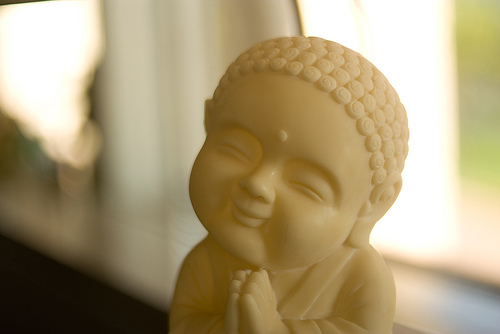
“Who does not thank for little will not thank for much.” -Estonian Proverb
Recently I’ve felt frustrated because someone I asked to help me has done less than I hoped he would. At first I felt this was unfair, because I’ve been supportive of him. Then I realized I was overlooking what he did do for me while dwelling on what he didn’t.
This made me think of some research I referenced in my book (which I originally found in a book called Sway.)
In a German research study, strangers were “partnered up,” though anonymously and kept in separate rooms with $10 to split between them.
One participant in each pair got to decide how the money would be split, and the other had to decide whether or not to accept the offer. If he or she refused, neither would get to keep any money.
You might assume that any offer would be good since some money was better than none; but most of the time, when the partner with the power decided to give himself a higher share the other person rejected the offer because it wasn’t fair. The results remained the same when the researchers repeated the experiment with $100 instead of $10.
Researcher Joseph Henrich conducted this same study at UCLA using $160, what a student might earn in three days of work. Most students decided to split the money because it was fair, but they also admitted they wouldn’t have accepted any less than 50% if the tables were turned.
Henrich finished his research by bringing this experiment to Machiguenga, an isolated section of the Amazon. Unlike in the other experiments, these people were willing to accept any offer because it was money they wouldn’t otherwise have—and they actually understood if the person who divvied it up chose to keep a larger share.
Instead of assuming they were entitled to half, they felt grateful to have gotten any at all.
We carry around a lot of beliefs about how things should work in the world, and sometimes they work against us. In assuming life is unfair for giving us 30% of what we think we deserve, we forget how fortunate we are to be given anything at all.
We might not always get exactly what we want. We can either dwell on that, or choose instead to appreciate and do the best with what we get.
Part of this post is excerpted from my book Tiny Buddha: Simple Wisdom for Life’s Hard Questions.
Photo by Mcciva1
About Lori Deschene
Lori Deschene is the founder of Tiny Buddha. She started the site after struggling with depression, bulimia, c-PTSD, and toxic shame so she could recycle her former pain into something useful and inspire others to do the same. You can find her books, including Tiny Buddha’s Gratitude Journal and Tiny Buddha’s Worry Journal, here and learn more about her eCourse, Recreate Your Life Story, if you’re ready to transform your life and become the person you want to be.
- Web |
- More Posts













 Though I run this site, it is not mine. It's ours. It's not about me. It's about us. Your stories and your wisdom are just as meaningful as mine.
Though I run this site, it is not mine. It's ours. It's not about me. It's about us. Your stories and your wisdom are just as meaningful as mine.
Wise words. I could already totally relate to this when I read it in your book.
When I was 13 years old, I won a trip to Las Vegas, tickets for a Britney Spears concert and a meet-up with her. The magazine were not able to make the meet-up happen and I was resentful for years.
I should have been elated because I won a free trip and an had an experience of a life-time. it takes some effort to shift your mindset and to let go of the feelings of entitlement, but life can be so much richer and more satisfying if you are grateful for what you get instead of what you don’t.
That must have been so exciting for you! That’s too bad the magazine didn’t make it happen, but it sounds like you learned a great lesson through the experience.
Gratitude for things big or small has always been a key to happiness. Thank you for this post. 🙂
You’re most welcome. =)
I am always demanding equal share of help rather than appreciating what I get. I, too, always have this expectation of how much one should help me, and what they should do to help me and whatnot. And since most of the time, people failed to do x, y, and z all the way through, I’d get so disappointed even if they at least helped me one bit. Then I start feeling people don’t seem to care…. and the list goes on. So I’m glad I read this article here. I have such trouble accepting what I have and being grateful for what I have, I hate it :
I’m glad this helped Jen! I find that whenever I get caught up in thoughts about entitlement, I feel bitter–which makes it really difficult to do anything positive or productive. It always helps me to shift to gratitude!
Life will be grateful if we know how to appreciate what we had. Thanks for this article!:)
You’re most welcome!
Instead of being grateful for the wonderful things that came from one of the finest relationships I’ve ever had and instead of recognizing how much I’ve changed for the better because of it, I’ve been giving more power to the disappointment I’ve felt in the knowledge that we just couldn’t sustain the relationship any more. Slowly, I’ve been moving toward appreciation for what I received and being grateful for all the good that came my way, even if it was for less time than I had expected. I thank you for this blog that has helped speed up that process.
You’re most welcome Kathi. Your story reminded me of that Dr. Seuss quote, “Don’t cry because it’s over; smile because it happened.” It’s certainly an empowering way to look at experiences that have run their course.
Life will be grateful if we know how to appreciate what we had.
best backlinks